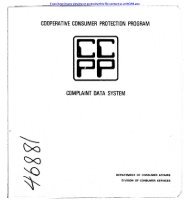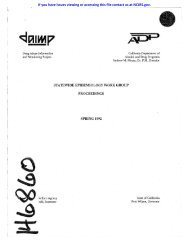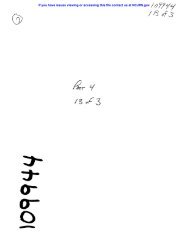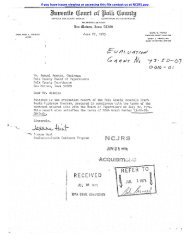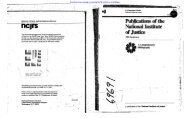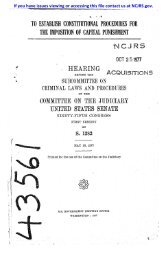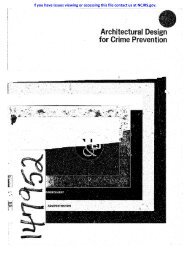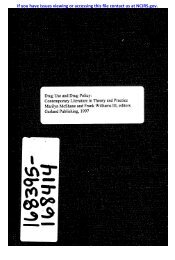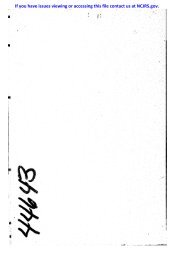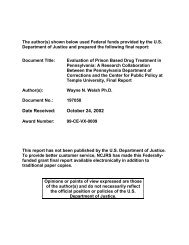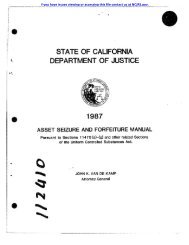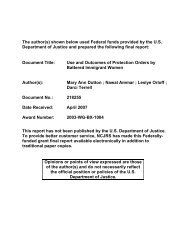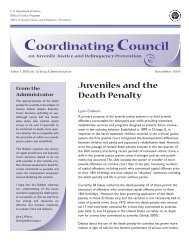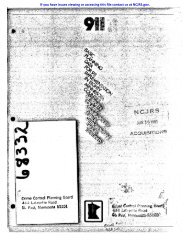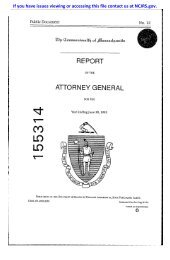Conflict Resolution Education - National Criminal Justice Reference ...
Conflict Resolution Education - National Criminal Justice Reference ...
Conflict Resolution Education - National Criminal Justice Reference ...
Create successful ePaper yourself
Turn your PDF publications into a flip-book with our unique Google optimized e-Paper software.
cooperation is promoted throughout the school,<br />
the problem-solving processes of conflict resolution<br />
seem natural, logical, and desirable. Cooperative<br />
systems create a context in which conflicts can be<br />
resolved constructively and reduce the factors that<br />
place individuals at risk for using violence.<br />
Many methods of school behavior management are<br />
based on punishment rather than discipline. Such<br />
programs gain student compliance through externally<br />
imposed behavior expectations that are enforced<br />
through coercion. In schools that function in<br />
this way, the most significant observable behavior—<br />
the adult model—is contrary to conflict resolution<br />
principles—respect, tolerance, and appreciation for<br />
differences. Gisela Konopka has commented that:<br />
Obedience is demanded to achieve a person<br />
with discipline, but this is a discipline that comes<br />
from the outside and works only when one is<br />
afraid of someone who is stronger than oneself.<br />
We do need discipline, an inner discipline to<br />
order our life. What is inner discipline? To my<br />
thinking it is the opposite of blind obedience.<br />
It is the development of a sense of values. 5<br />
Table 2 contrasts punishment practices with<br />
discipline practices.<br />
The goal of the peaceable school is to create a schoolwide<br />
discipline program focused on empowering students<br />
to regulate and control their own behavior. The<br />
program allows educators to model an orderly, productive<br />
system accomplished through cooperation and<br />
persistent pursuit of constructive behavior. Students<br />
are provided alternative ways to behave, not just told<br />
to refrain from behaving in a particular manner. The<br />
behavior management program thus becomes an<br />
educational program. The problem-solving processes<br />
of conflict resolution enable students to achieve principled<br />
responses. The following sections present two<br />
examples of peaceable school approaches.<br />
Resolving <strong>Conflict</strong> Creatively<br />
Program<br />
The Resolving <strong>Conflict</strong> Creatively Program (RCCP)<br />
is one of the initiatives of Educators for Social<br />
Responsibility (ESR—see chapter 4, page 37).<br />
In RCCP, adults reach young people by relating<br />
41<br />
to them daily in their homes, schools, and communities.<br />
RCCP requires the support of the highest levels<br />
of the school’s administration before the program<br />
is implemented. A participating school district must<br />
make RCCP part of its vision for change and commit<br />
to multiyear involvement to ensure proper institutionalization<br />
of the program. The RCCP approach<br />
involves five components: professional development<br />
for teachers and other staff, regular classroom instruction<br />
based on a kindergarten through 12th<br />
grade (K–12) curriculum, peer mediation, administrator<br />
training, and parent training. 6<br />
It was a whole different philosophy for<br />
me—the way I looked at the world. Children<br />
taking responsibility for themselves; that was<br />
very different for me. For the first time in<br />
my life, I was hearing people say in a school<br />
setting: “It’s okay to be different.” All of a<br />
sudden here was a program saying: “You<br />
are all good people. You all have something<br />
to contribute.” I was exposed to a rainbow<br />
coalition of children who were learning how<br />
to get along. It was just wonderful.<br />
Teacher, Anchorage, Alaska<br />
Professional Development for Teachers<br />
and Other Staff<br />
A 25-hour introductory course is provided for<br />
teachers interested in implementing RCCP in their<br />
classrooms. This training presents the theory and<br />
methods of conflict resolution, intercultural understanding,<br />
and emotional and social literacy; prepares<br />
participants to model and teach these skills in their<br />
classrooms; illustrates ways to incorporate conflict<br />
resolution strategies and skills into academic subjects;<br />
and demonstrates creative teaching techniques<br />
such as role-playing, interviewing, brainstorming,<br />
small-group sharing, and cooperative learning teams.<br />
The staff development component gives teachers<br />
the opportunity to receive feedback on lessons<br />
that they teach and see skilled practitioners give<br />
demonstration lessons in the classroom. They can<br />
also plan classroom activities and find resources



